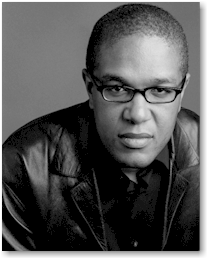
This interview with Christopher John Farley first appeared in the Kingston Book Festival supplement in the Jamaica Observer on March 3, 2013.
Background
Christopher John Farley is a Jamaican-born writer who has had a significant impact on music journalism in the United States. After graduating from Harvard University in 1988, Christopher started writing for Time magazine in 1992, holding “one of American journalism’s most sought after jobs as Time magazine’s pop-music critic.”
He has interviewed Whitney Houston, Halle Berry, Adele, and Bob Dylan among many other celebrities, and frequently appears on MTV, CNN, and MSNBC to talk about music and pop culture. If that weren’t enough, he has also written biographies of Halle Berry, Bob Marley, and Aaliyah, as well as two novels. He is currently the Senior Editorial Director of Digital Features at The Wall Street Journal.
Christopher is the perfect person to headline a festival dedicated to celebrating books on the arts.
Questions
LR: You are very well-known in music journalism. Can you tell us how you got involved in writing about the arts?
CJF: My mother, Dr. Ena Farley, who is now retired, served as the chairperson of the African-American studies department at the State University of New York at Brockport. She was born and raised in Jamaica and often led students on cultural, historical, and educational trips to the island, and was deeply involved in other endeavors for the college that celebrated African-American involvement with the arts. My father, Dr. Rawle Farley, an economist who hailed from Guyana, founded the Festival of One-Act Plays in Belize and the British Honduras National Festival of the Arts, among many other things. The event was once called “the biggest and most important cultural event in Belize.” So a lot of my love of the arts and entertainment comes from my parents. I was born in Kingston, but raised in Brockport, N.Y., which is a terrific college town, but still pretty small. Reading and writing allowed me to explore the world. When I wasn’t running cross-country or playing basketball, I used to spend all day in the Brockport University library as a teen and pre-teen, just reading stacks of books.
LR: Why did you decide to make the leap from music critique to biographies about entertainers? How difficult was the switch as a writer?
CJF: I’ve always been troubled by the fact that writers from the African Diaspora don’t always get the opportunity from top American publishers to write major biographies about significant artistic figures. Too often we do the creating and someone else does the interpretation, telling people around the world how they should feel and think about our words, our songs, our art. I feel our stories need to be told by writers who understand and respect the cultural history of the artists in question. So I’ve tried to make the most of every chance I’ve gotten to tell our stories. I loved working with Martin Scorsese on the book I co-wrote called “The Blues,” a nonfiction look at the history of American roots music. I felt honored to write my biography “Before the Legend: The Rise of Bob Marley.” And every time I think about my book “Aaliyah: More Than a Woman,” I think back to the last time I talked to her, and I see her face—the dark eyes, the dark hair, the dark smile. Ironically, I find that the task of telling someone’s life story has nearly killed me every time I’ve done it. Writing a biography is a blessing and a burden—you owe it to your subject, your readers and yourself to give it everything you’ve got, and to give some things you never knew you had.
LR: I read somewhere that you prefer novel-writing to journalism. Why is that?
CFJ: I love journalism and writing novels. I don’t think I could choose between the two anymore than I could choose between breathing in and breathing out. Back when I was at college, the school newspaper, The Harvard Crimson, was considered to be a rival to the school humor magazine, the Harvard Lampoon. I became an editor of the Crimson and an editor of the Lampoon and felt no contradiction. From an early age I’ve always wanted to push the limits of my writing and explore my interests in both fiction and nonfiction. In my novel “Kingston By Starlight,” the two forms blended—I spent years researching the life of the female pirate Anne Bonny, and then years more employing the art of fiction to get to the truth and the drama of her story.
LR: Can you give us any hints about your keynote speech for the festival on Friday at Redbones?
CJF: Don’t miss it. Don’t come late. Do bring friends.
LR: You will also be chairing a workshop on the business of memoirs earlier on Friday. Is a memoir in the works for you?
CJF: I’m old enough to know I’m too young to write a memoir about my life!
[Author’s note: I guess I’m not old enough to know this yet…my memoir should be published late this year / early next year.]
LR: What is your current passion project?
CJF: I have a children’s book due out in February of 2014 called “Game World.” I’ve always loved books aimed at younger readers like “The Catcher in the Rye” and “The Hobbit.” My book taps into the wellspring of Jamaican culture to tell an original story. I’m hoping that a younger generation of readers will pick it up and be inspired to tell their own tales.
See related article: A Book Festival in Kingston.